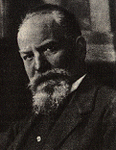Edmund Husserl

Phenomenlogist
1859-1938
Husserl is the father of phenomenology. Born in the former Czechloslovakia,
Husserl studied in Leipzig, Berlin and Vienna, where he also taught. He
began his studies as a mathemetician, but his studies were influenced by
Brentano, who moved him to study more psychology and philosophy. He wrote
his first book in 1891, The Philosophy of Arithmetic. This book
dealt mostly with mathematical issues, but his interests soon shifted.
Husserl immersed himself in the study of logic from 1890-1900, and he soonafter
produced another text: Logical Investigations(1901).
Some of his major ideas of this era were intentionality, relations,
and identity of things. He came to focus on perceptual experience, and
as he began to shed his early Kantian ways, he wrote Ideas Pertaining
to a Pure Phenomenology and Phenomenological Philosophy(1913). His
last three books were Formal and Transcendental Logic(1929), Cartesian
Meditations(1931), and Lectures on the Phenomenology of Inner Time-Consciousness(1928),
a group of lectures he compiled and edited. His lectures and essays comprise
a large amount of his works.
Husserl attempted to shift the focus of philosophy away from large
scale theorization, towards a more precise study of discrete phenomena,
ideas and simple events. He was interested in the essential structure of
things, using eidetic analysis of intensionality to yield apodictic(necessary)
truths.
Husserl aided philosophy, breaking the Cartesian trap of dualism with
new ideas like intensionality. He was perhaps the most important force
in revitalizing 20th century continental philosophy.
See Also:
All Material Copyright © Chris Marvin 1995-2000
|